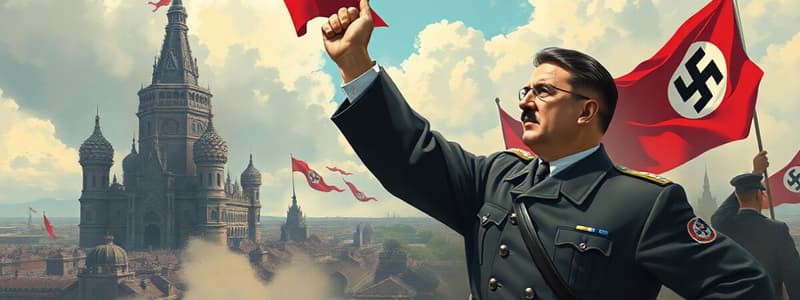Podcast
Questions and Answers
What was the original name of the Nazi Party before it transformed in 1920?
What was the original name of the Nazi Party before it transformed in 1920?
- German Workers' Party (correct)
- German National Party
- Social Democratic Party
- Socialist Workers' Party
Which factors contributed to Hitler's appeal as a leader during his rise to power?
Which factors contributed to Hitler's appeal as a leader during his rise to power?
- The careful orchestration of party rallies and propaganda (correct)
- His background in military service
- His radical beliefs and anti-Semitism
- The immediate economic recovery following World War I
What role did the social and political climate play in Hitler's rise to leadership?
What role did the social and political climate play in Hitler's rise to leadership?
- It encouraged collaboration among political parties.
- It diminished his appeal and led to opposition.
- It created a sense of hopelessness that he exploited. (correct)
- It made the German people reject extremist views.
How did the Nazi Party present Hitler to the public?
How did the Nazi Party present Hitler to the public?
What was a significant consequence of Hitler's actions toward political opposition in 1934?
What was a significant consequence of Hitler's actions toward political opposition in 1934?
Which of the following was NOT a contributing factor to Hitler's success by January 30, 1933?
Which of the following was NOT a contributing factor to Hitler's success by January 30, 1933?
What was a key aspect of the 'Hitler Myth'?
What was a key aspect of the 'Hitler Myth'?
What character trait helped solidify Hitler's reputation among his supporters?
What character trait helped solidify Hitler's reputation among his supporters?
Flashcards
Nazi Party's Rise to Power
Nazi Party's Rise to Power
The Nazi Party, initially a small group, became increasingly popular through the use of Hitler's charisma and skillful propaganda.
Hitler's Appeal
Hitler's Appeal
Hitler's effectiveness as a leader involved tapping into the public's fears and desires. He exploited the economic instability and national discontent prevalent in Germany after World War I.
The 'Hitler Myth'
The 'Hitler Myth'
The 'Hitler Myth' refers to the carefully constructed image of Hitler as a strong and decisive leader.
Hitler's Political Success
Hitler's Political Success
Signup and view all the flashcards
Hitler's Ruthless Actions
Hitler's Ruthless Actions
Signup and view all the flashcards
Nazi Propaganda
Nazi Propaganda
Signup and view all the flashcards
Hitler's Economic Success
Hitler's Economic Success
Signup and view all the flashcards
German People's Acceptance of Violence
German People's Acceptance of Violence
Signup and view all the flashcards
Study Notes
Hitler's Rise to Power
- NSDAP (Nazi Party) emerged from DAP, initially a small, radical, anti-Semitic, and völkisch (nationalist) party.
- Received minimal attention within Weimar political landscape initially.
- By January 30, 1933, the party had 849,000 members, and Hitler was appointed Chancellor.
- Hitler presented himself as a divinely appointed leader, tasked with liberating Germany from post-war suffering and leading it into a glorious future.
Hitler's Appeal
- National Socialist propaganda portrayed Hitler as a leader driven by the will of the people.
- Hitler's rallies and speeches were carefully orchestrated.
- German economic recovery following the Great Depression and the resulting decrease in unemployment boosted Hitler's popularity.
- The suppression of political opposition.
The "Hitler Myth"
- Public perception of Hitler was highly idealized; he was seen as a powerful, decisive leader.
- His image was developed through propaganda and the popularization of specific narratives.
- This iconic image transcended personal characteristics and political realities.
- This fabricated persona contributed to Hitler's rise and sustained his authority.
Studying That Suits You
Use AI to generate personalized quizzes and flashcards to suit your learning preferences.




